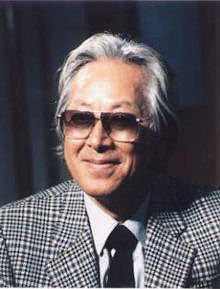Hiroshi Nishio(Japanese:西尾 孔志 Hepburn:Nishio Hiroshi) is a Japanese film director, animator, and writer born in 1974 in Osaka, where he is currently based. Nishio started his career as an animator on anime including "Moldiver" and the TV series Sosei kishi Gaiasu. As a teenager, he started working on sets of movies by Japanese director Kinji Fukasaku. [1] He moved on from animation, starting off with short films, before making his first feature film National Anthem —a horror film—in 2003. His next movie was the surreal Ochon-chan: Pussy's Adventures in Love and Revolution (Ochonchan no ai to bōken to kakumei おちょんちゃんの愛と冒険と革命) in 2005. Ochon-chan was picked for Osaka's CO2 Film Festival, and then was one of two movies selected from that to feature at the 2005 Raindance Film Festival in London. [2]
Japanese is an East Asian language spoken by about 128 million people, primarily in Japan, where it is the national language. It is a member of the Japonic language family, and its relation to other languages, such as Korean, is debated. Japanese has been grouped with language families such as Ainu, Austroasiatic, and the now-discredited Altaic, but none of these proposals has gained widespread acceptance.
Hepburn romanization is a system for the romanization of Japanese that uses the Latin alphabet to write the Japanese language. It is used by most foreigners learning to spell Japanese in the Latin alphabet and by the Japanese for romanizing personal names, geographical locations, and other information such as train tables, road signs, and official communications with foreign countries. Largely based on English writing conventions, consonants closely correspond to the English pronunciation and vowels approximate the Italian pronunciation.

Kinji Fukasaku was a Japanese film director and screenwriter who rose to prominence for his association with the Japanese New Wave.
Contents
His most recent film Hakodate Coffee was shot in Hokkaido, Japan, and was based on the manga of the same name.
Hakodate Coffee (函館珈琲) is a Japanese drama film, released in 2016, by director Hiroshi Nishio. The film is centred around the drama of the people in a western style apartment block called Hisuikan, in Hokodate, Hokkaido Japan. It was directed by Hiroshi Nishio, written by Nanoha Ito and produced by Sanshiro Kobayashi, Atsushi Obinata. The film was featured as part of the Osaka Asian Film Festival, and the Nippon Connection Festival
His recent movies are often generally quirky dramas, with a touch of comedy, set in rural Japan. Nishio won the Osaka Film Festival New Director's Award in 2013, for Souru furawâ torein .







